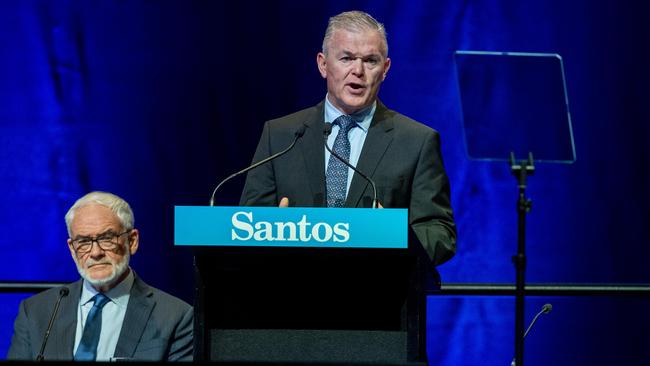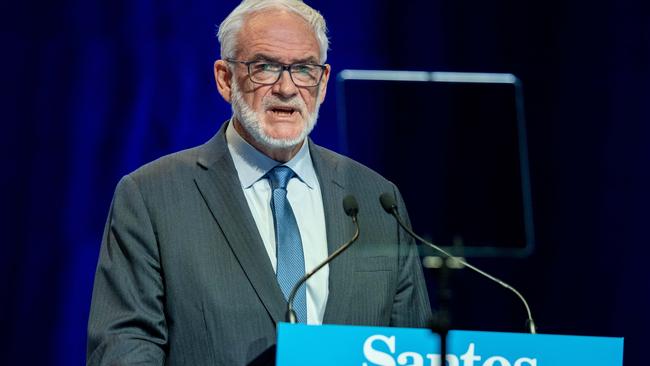Santos reassures investors its $5.8bn Barossa gas project remains on track
Santos has reassured investors its $5.8bn Barossa gas project remains on track and doubled down on its criticism of changes to a key government climate policy.

Santos has doubled down on its criticism of government intervention and red tape in the Australian oil and gas sector, but reassured investors its $5.8bn Barossa gas project in the Timor Sea remains on track despite the uncertainty surrounding changes to the federal government’s safeguard mechanism.
Addressing shareholders at the company’s AGM on Thursday, Santos chief executive Kevin Gallagher said the project was still on track to commence production on time and on budget in 2025, but underlined the importance of the company’s proposed Bayu-Undan carbon capture and storage project in meeting the company’s environmental obligations.
Given the CCS infrastructure in Timor-Leste is not expected to be up and running until 2027, Santos plans to offset its emissions at Barossa in the first two years of operation by acquiring carbon offsets.
The new safeguard mechanism rules, due to come into force on July 1, require all new gas fields for LNG export to be carbon-neutral from the time they start producing.
Speaking after Thursday’s meeting, Mr Gallagher said the company remained committed to the Barossa project, which would become one of the world’s least carbon intensive LNG projects after commissioning of the CCS development.
“We’ve already invested in the pipeline, the Darwin duplication pipeline that allows us to use the existing Bayu-Undan pipeline for the carbon capture project, so we’ve invested a few hundred million dollars in that pipeline,” he said.
“Our commitment to this is absolute. This is what we want to do.
“Barossa has one advantage over many other projects, and that is that it’s very close to market. And so if you look at the Scope 1, 2 and 3 emissions, Barossa competes very well with other projects in this region.”
The Barossa gas development, about 300km north of Darwin, is one of the more carbon intensive projects in the Santos portfolio, with a CO2 content of about 18 per cent.
The venture, which includes giant Japanese LNG importer JERA and South Korea’s SK Group, would supply gas to Asia through the Darwin LNG export plant.

However the new safeguard mechanism rules are seen as another potential setback following a Federal Court ruling last year that overturned Santos’ environmental approval, forcing it to restart and broaden its consultation with local indigenous communities.
Mr Gallagher said more details around the new safeguard mechanism legislation were needed “ASAP” to determine the full impact it would have on the Barossa project.
“The regulations that support the legislation are yet to be developed and so we’ll be working with the government over the weeks ahead to get clarity on that, and if that changes, and that has any impact on schedule, then we will have to take that into account at that point in time,” he said.
“What I’ve always said is that our current view, and our forecast, and our budget for Barossa is that it can still come online in the first half of 2025. We believe that, we’re working to that.
“And so what we need from governments now is a better focus and acceleration on the regulatory framework to allow the transfer of CO2 between two countries.”
Santos is an early mover in the CCS space in Australia, with the Bayu-Undan CCS project expected to store up to 10 million tonnes of CO2 per year, or about 1.5 per cent of Australia’s annual carbon emissions, making it the largest CCS project in the world.
It is also developing a CCS facility at Moomba, in South Australia’s Cooper Basin, which could come online as early as next year, and is conducting feasibility studies into a potential CCS facility in the offshore Carnarvon and Bonaparte basins, off the coast of Western Australia.
However Mr Gallagher said Australia was falling behind the rest of the world in CCS advances, pointing to the US as an example where the government had thrown its support behind the emerging technology through tax credits and other incentives included in its Inflation Reduction Act.
“The importance of the oil and gas sector in delivering abated fossil fuels has been embraced in the United States,” he said.
“Australia’s been very slow ... I put that down to the fact that we do not have bipartisan climate policy support in Australia. And unfortunately what that means is we don’t have bipartisan energy policy support either. And so that power has been handed to the Greens essentially and they just want to shut everything down.
“I call on all sides of government to get together so that we can have sensible energy policy, sensible climate policy, give us the stability and remove this overhang we have in Australia today - the sovereign risk overhang we have today which is scaring investment away from Australia.”
Santos and other industry players have been highly critical of the retrospective nature of the safeguard mechanism changes, which could apply to projects that have already reached a final investment decision but have not yet come online.
During his address to shareholders, Santos chairman Keith Spence said it was government decisions like those that had made Australia “a harder place to invest”.
“We face ongoing challenges in securing regulatory approvals for resource development, price regulation, potential contract interference and the prospect of increasing resource taxation,” he said.
“These factors combine to put at risk future supply of the critical fuels needed to meet strong ongoing demand from our customers.
“When these regulatory changes are retrospective - coming after final investment decisions and financial commitments have been made – they make Australia a harder place to invest.”
Santos avoided a second strike against its remuneration report on Thursday, with close to 90 per cent of shareholders approving the report.
Santos shares were trading 0.6 per cent lower in afternoon trade at $7.12.





To join the conversation, please log in. Don't have an account? Register
Join the conversation, you are commenting as Logout